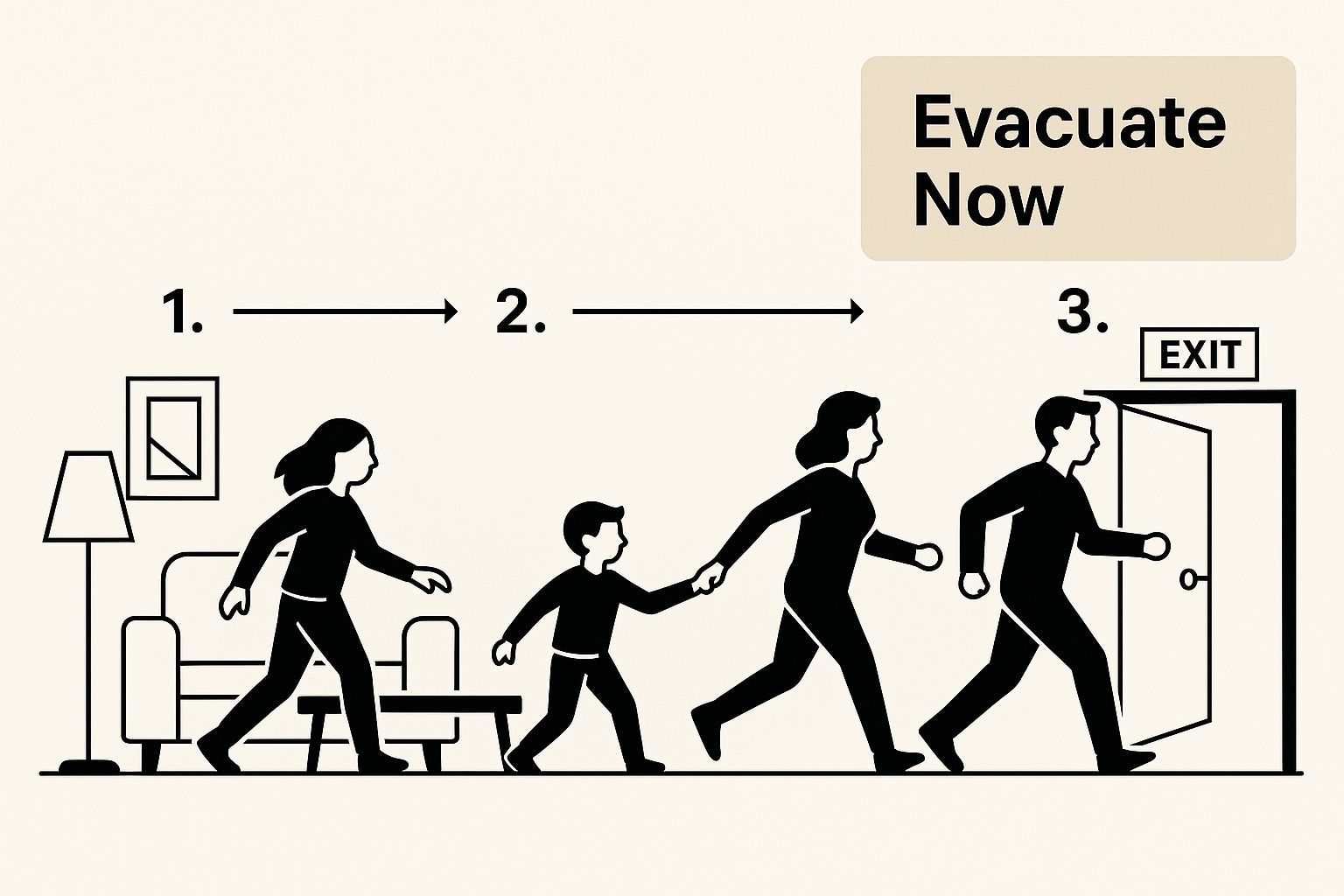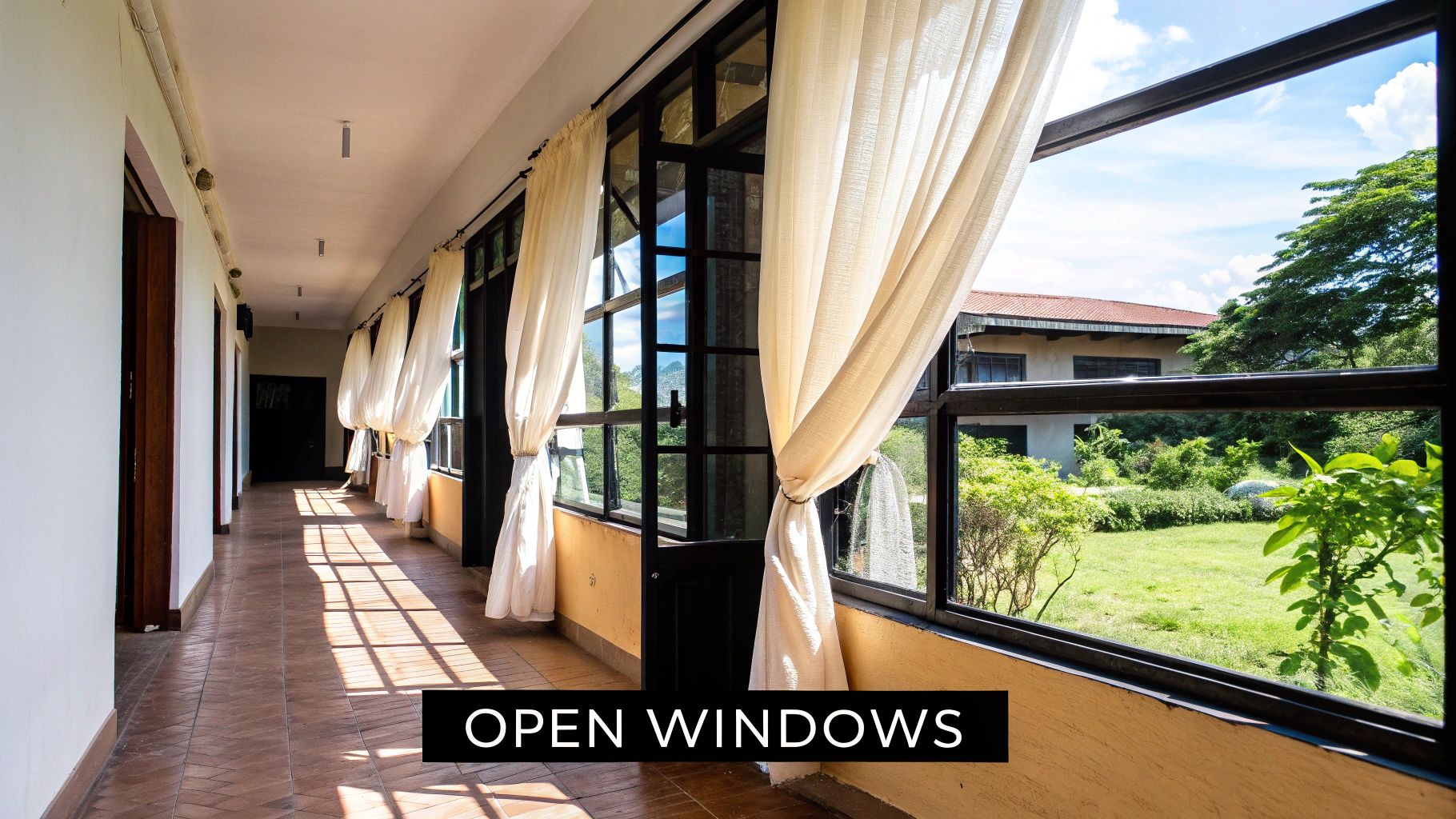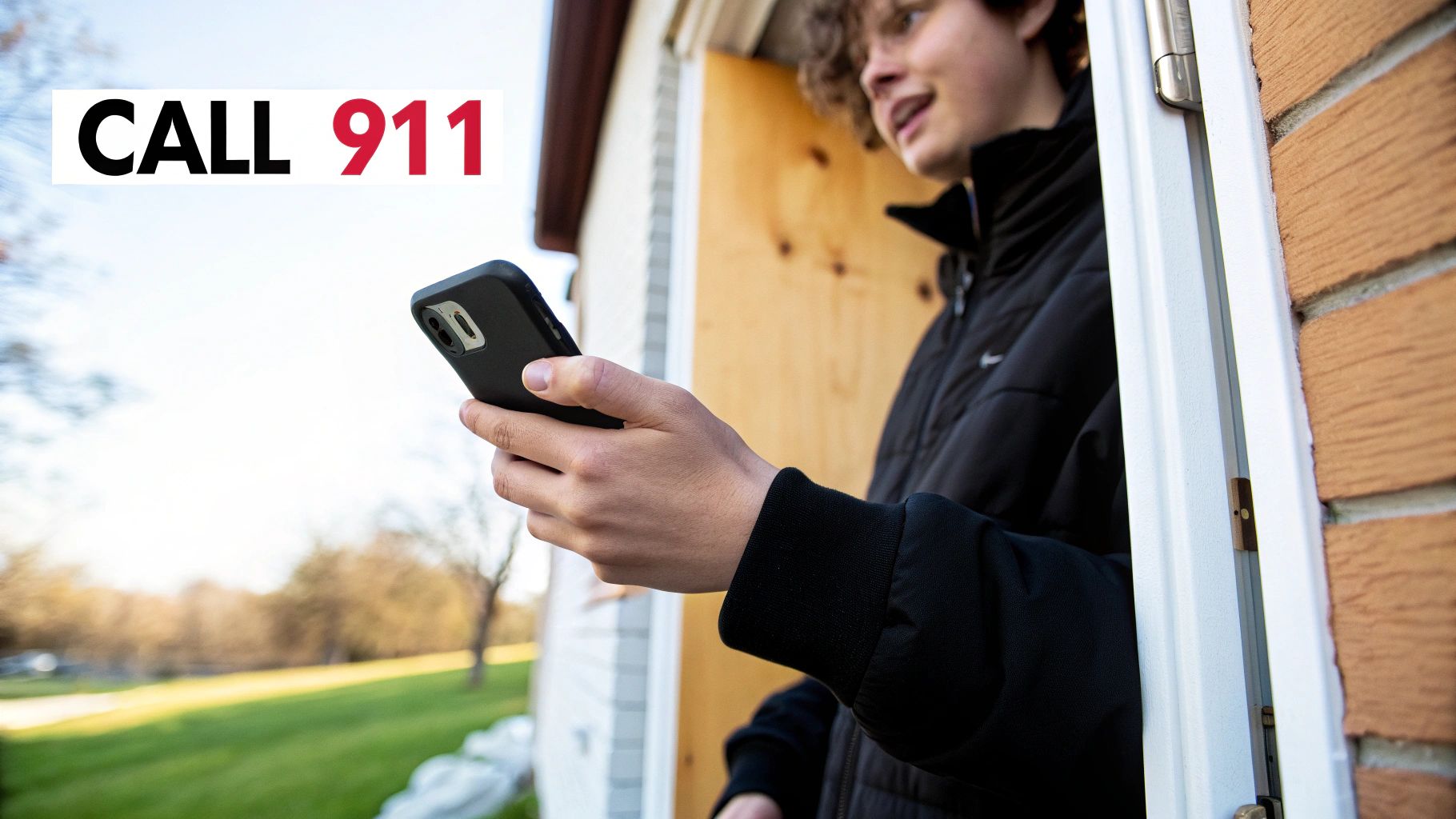What to Do If Carbon Monoxide Alarm Goes Off: Essential Safety Tips
- Luke Yeates
- Aug 19, 2025
- 10 min read
That piercing shriek from your carbon monoxide alarm is designed for one thing: immediate action. It’s not a sound you ever want to hear, but knowing exactly what to do can quite literally be the difference between life and death. Your first and only priority is to get everyone—family, visitors, and pets—out into the fresh air straight away.
Your Immediate Action Plan
Don't stop to figure out which appliance is faulty. Don't waste precious seconds opening all the windows. Your only job is to evacuate.
Imagine you're relaxing at home in the Langney area of Eastbourne, and the alarm suddenly goes off. The instinct might be to investigate, but you have to fight it. As you’re leaving, you can open a nearby door or window if it’s on your way out, but only if it doesn’t slow you down. The mission is simple: get outside.

This really drives home the point: getting out is the non-negotiable first step.
Calling for Emergency Help
Once you’re safely away from the house, grab your mobile or ask a neighbour to use their phone and call 999.
It’s vital you tell the operator that your carbon monoxide alarm is going off. Give them your address, confirm everyone is safely out of the property, and let them know if anyone is feeling unwell or showing symptoms like a headache, dizziness, or nausea.
The silent, invisible nature of CO is what makes it so incredibly dangerous. Every year in England and Wales, more than 60 people die from accidental CO poisoning, and many of these tragedies happen in people's homes. This is precisely why a swift response is so critical. You can learn more about the statistics on the dangers of CO at carbonmonoxideinfo.co.uk.
Your Immediate Action Checklist
The moment you hear that alarm, your mind can go blank. This quick checklist breaks down the life-saving steps to take immediately.
Action | What to Do | Why It's Critical |
|---|---|---|
Evacuate Immediately | Get everyone, including pets, out of the house into fresh air. | Every second spent inside increases exposure to potentially lethal gas. |
Call 999 | From a safe location outside, call 999 and ask for the fire service. | Professionals are equipped to safely enter the property and assess the danger. |
State the Emergency | Tell the operator it's a carbon monoxide alarm. | This ensures the correct emergency response is dispatched immediately. |
Report Symptoms | Mention if anyone feels unwell (headache, dizzy, sick). | This information is crucial for paramedics who may also be dispatched. |
Stay Outside | Do not go back inside for any reason. | CO levels could still be dangerously high. Wait for the all-clear. |
Following these steps without hesitation is the best way to ensure everyone’s safety.
Do not re-enter your home for any reason. Wait for the fire service to arrive, assess the situation, and declare the area safe. They have the right equipment and training to handle it.
Never, ever assume it’s a false alarm. Treat every single activation as a genuine emergency until a professional—whether it's the fire service or a Gas Safe engineer from a trusted local company like Harrlie Plumbing and Heating—confirms it’s safe. That decisive, no-questions-asked response is what will protect you and your family from a silent killer.
Recognising the Symptoms of CO Poisoning
While your alarm gives you that crucial warning, it's just as important to listen to what your body is telling you. The real danger with carbon monoxide is how sneakily its symptoms can mimic common illnesses like the flu, especially during those colder months when everyone in Eastbourne has their heating on full blast.

Picture this: a family in an Old Town terrace is feeling unusually tired and sluggish one winter evening. It's easy to brush it off as just a long day, but it could be the subtle start of CO poisoning. That’s why you have to connect the dots between the alarm blaring and how you're feeling – it paints a much clearer picture of the urgency.
Even low-level exposure over time can cause nagging health problems. Government advice points out that ongoing exposure can lead to headaches and lethargy, while an acute exposure—the kind that sets your alarm off—demands you get out immediately. Recognising symptoms like dizziness is a vital part of your response. If you'd like to dive deeper, you can read the full toxicological overview on the GOV.UK website.
Early and Severe Warning Signs
It's absolutely vital to know the difference between the first subtle signs and the more severe indicators of poisoning. If you hear that alarm and anyone is showing symptoms, getting them medical help is just as critical as getting them outside.
Early Symptoms to Watch For:
Tension-type headaches – this is usually the very first sign.
Dizziness or feeling light-headed and unsteady on your feet.
Nausea and a generally upset stomach.
Tiredness and unexplained drowsiness that feels out of place.
A huge giveaway is if several people in the house—including your pets—suddenly feel unwell at the same time. The flu rarely hits everyone in the household at once. If this happens, you should immediately suspect CO poisoning.
If exposure continues, the symptoms can quickly escalate to become life-threatening.
Severe Symptoms Demanding Urgent Care:
Breathlessness or finding it hard to catch your breath.
Confusion and muddled thinking.
Blurred vision or a loss of coordination.
Loss of consciousness.
If anyone shows these severe signs, make sure you tell the 999 operator straight away. The second you are all safely outside, take stock of how everyone is feeling. Don't try to downplay it or second-guess what's happening; let the medical professionals figure it out.
Getting Your Home Declared Safe After an Alarm
After the fire service has been and the immediate danger is over, the first question on everyone's mind is, "When can we go back inside?" The answer to that is simple and non-negotiable: never re-enter your property until a qualified professional has declared it safe. This isn't a time for guesswork; your family's safety relies entirely on an expert's all-clear.
This is where a Gas Safe registered engineer you can trust comes in. For example, if your home in the Sovereign Harbour area has been evacuated, once the emergency services have done their job and left, it's our turn at Harrlie Plumbing and Heating to step in and carry out a thorough investigation to find the exact source of the carbon monoxide leak.

This process is meticulous, and for good reason. We don't just have a quick look around; we perform a full safety inspection of all your fuel-burning appliances and their ventilation systems to get to the root of the problem.
Pinpointing the Problem
The source of a CO leak can be glaringly obvious or surprisingly well-hidden. Our engineers are trained to check for a whole range of culprits, both common and uncommon, to give you a clear picture of what went wrong.
Some of the common issues we find in homes across Eastbourne include:
Faulty Boilers: An old, poorly maintained boiler in a Sovereign Harbour flat could be burning fuel improperly.
Blocked Flues or Chimneys: It's amazing how easily a bird’s nest or some debris can block a flue in an Old Town terrace, forcing dangerous gases back into your home.
Cracked Heat Exchangers: This is a serious fault inside a furnace that allows CO to mix with the clean air circulating around your house.
Gas Fires and Cookers: Even kitchen appliances can be the source if they’re incorrectly installed or have developed a fault.
Do not use any fuel-burning appliances again until a Gas Safe registered engineer has identified and repaired the fault. Turning the boiler back on could recreate the dangerous situation all over again.
Once we’ve found the problem, we’ll walk you through exactly what repairs are needed. Our absolute priority at Harrlie Plumbing and Heating is to restore safety and give you complete peace of mind that your home is secure once more. This is why having access to professional help is so crucial; you can learn more about how to get help fast when you need an emergency plumber in Eastbourne in our detailed guide.
How to Prevent Carbon Monoxide Leaks
The best way to deal with a carbon monoxide alarm is to make sure it never has a reason to go off. It sounds simple, and it is. This proactive approach boils down to one crucial habit for every homeowner: getting all your fuel-burning appliances serviced once a year.
Whether it’s the boiler that keeps your home warm, the gas fire in your living room, or even your cooker, a yearly check-up is non-negotiable. This is definitely not a DIY job—it must be carried out by a Gas Safe registered engineer. They have the proper training and tools to spot a potential danger before it becomes a life-threatening emergency.
Routine Checks Are Your Best Defence
Here in Eastbourne, we work on all sorts of properties, each with its own quirks. Older Victorian terraces in the town centre might have ageing flues that need a careful eye, while modern new builds out in Shinewater can have quite complex heating systems. An annual service from a professional team like Harrlie Plumbing and Heating is tailored to handle these specific risks.
During a service visit, a qualified engineer will:
Inspect your boiler and other appliances to ensure they're operating correctly.
Check that flues and chimneys are clear and venting dangerous gases safely outside.
Make sure there's enough ventilation for all your fuel-burning equipment to work properly.
This kind of preventative maintenance is absolutely vital. Official data shows that CO poisoning is still a serious public health issue in England and Wales, which is why the government is so focused on prevention through regular appliance servicing. You can see the reality of the situation for yourself in these CO poisoning statistics on the ONS website.
Simply put, a well-maintained appliance is a safe appliance. Scheduling that annual boiler service is the single most important step you can take to prevent a CO leak in your home.
Beyond calling in the professionals, a few simple habits can make a huge difference. Never block air vents or flues, as this can trap CO and cause a dangerous build-up inside. If you have a fireplace, get the chimney swept regularly, especially before you light it for the first time in the autumn. These small, consistent actions work together to keep your home and your family safe.
Choosing and Maintaining Your CO Alarms
Think of your carbon monoxide alarm as a silent guardian. It’s always on watch, but it can only do its job if it's the right type and in perfect working order. When you're picking one out, the single most important thing to look for is the British Standard EN 50291 certification. This little mark is your guarantee that it's passed a whole battery of rigorous safety tests.
There’s a whole range of alarms out there, from simple battery-operated units you can stick on the wall to smart alarms that ping an alert straight to your phone. Whichever model you go for, where you put it is absolutely critical for it to be effective.
Where to Install Your Alarms
Having a great alarm is only half the battle; installing it in the right spot is just as important. You need to make sure you have coverage in the places you're most vulnerable.
For total peace of mind, you should have an alarm:
On every single floor of your home to make sure the alert can be heard no matter where you are.
Within 1 to 3 metres of any appliance that burns fuel, like your boiler, gas cooker, or fireplace.
Near your sleeping areas, ideally in the hallway just outside the bedrooms.
This kind of setup means that if a leak were to happen overnight in a Meads property, for instance, the alarm would be loud and close enough to wake everyone in the house.
That annoying chirping sound isn’t the main alarm—it’s a maintenance alert. A single, intermittent chirp usually means the batteries are getting low or the entire unit has hit its 'end-of-life' and needs replacing straight away.
A Simple Maintenance Routine
A few quick checks are all it takes to keep your alarm ready to protect you. Get into the habit of pressing the 'test' button once a month. It’s a simple press that confirms the internal circuits and the siren are working as they should. You’ll also want to replace the batteries at least once a year, or as soon as you hear that low-battery warning chirp.
Even if your alarm is wired into the mains or has a sealed long-life battery, it still has an expiry date. Most CO detectors are designed to last between 5 and 10 years. If your unit is getting on a bit or you can’t remember when you bought it, the safest bet is always to replace it. A reliable alarm system is a non-negotiable part of your home's safety, just as vital as having an expert you can call. Our team of trusted plumbers in Eastbourne can always offer advice on appliance safety during any routine visit.
Common Questions About Carbon Monoxide Safety
We hear a lot of the same questions from homeowners in Eastbourne about carbon monoxide, and for good reason. Getting clear, straightforward answers is the best way to feel prepared and keep your family safe.
My Alarm Is Chirping, Not Blaring – What's the Difference?
This is a really common one. A loud, continuous alarm is an emergency – it means you need to get out immediately. An intermittent chirp, though, is different. It’s a maintenance signal, not a high-level alert.
That chirping sound, usually once every minute or so, almost always means one of two things: either the batteries are running low, or the alarm unit itself has reached the end of its life and needs replacing right away. Think of a continuous blare as a "Get Out Now!" and a chirp as a "Fix Me Now!"
If you've put fresh batteries in and the chirping won't stop, the unit is faulty or has expired. Don't just ignore it; you need to replace the entire alarm to make sure your home is still protected.
I Live in an All-Electric Home. Do I Still Need a CO Alarm?
Yes, absolutely. We strongly recommend it. It's a common misconception that no gas appliances means no risk, but carbon monoxide can creep in from other sources. Fumes from a car left running in an attached garage, for example, can easily seep into the house.
Here in Eastbourne, with our mix of terraced houses and flats, a neighbour's blocked flue could even direct CO into your property. An alarm is a simple and inexpensive precaution that brings total peace of mind.
How Often Should I Get My Boiler Serviced?
This is perhaps the most important question of all. Your boiler and any other gas appliances need to be serviced at least once a year by a Gas Safe registered engineer. This is the single most effective thing you can do to prevent a CO leak from ever happening.
When an engineer from Harrlie Plumbing and Heating services your boiler, they're doing much more than a quick check. They inspect the entire system, including flues and ventilation, to ensure every component is operating safely. If you want to know what separates a good engineer from a great one, take a look at our guide on finding a reliable plumber in Eastbourne.
For your annual boiler service or any other gas safety concerns, it pays to trust local experts. Contact Harrlie Plumbing and Heating for a free, no-obligation quote and keep your home safe all year round. https://www.harrlieplumbing.co.uk

Comments